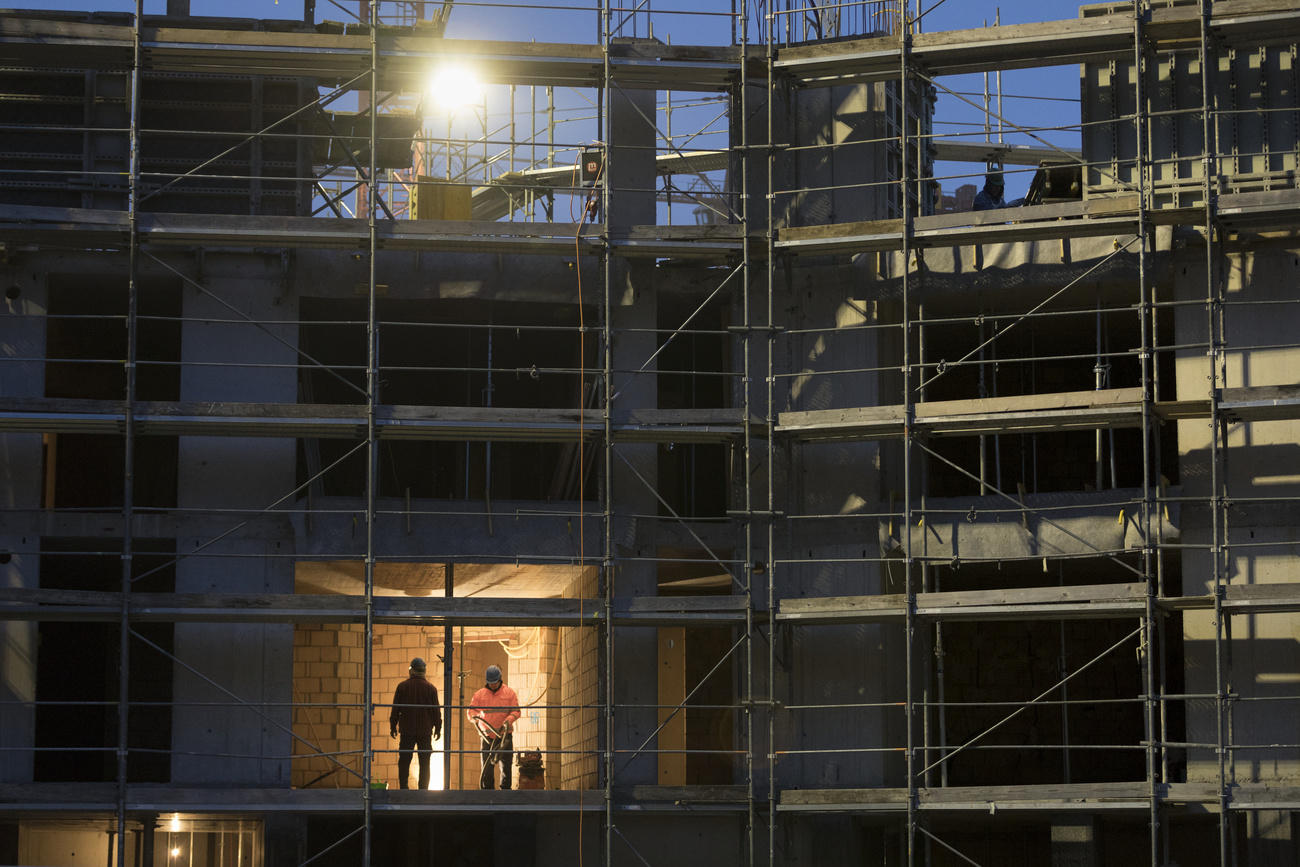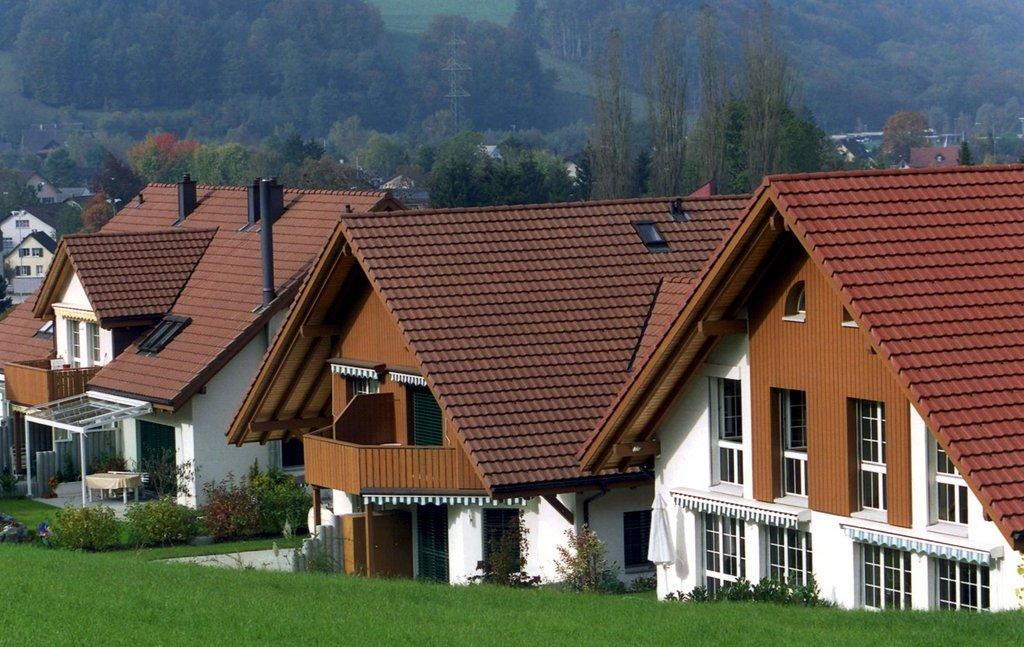
Do the Swiss need at least 10% social housing?

Opinions are divided about a Swiss proposal to promote housing owned by the state or non-profit groups. Supporters argue it helps curb speculation while opponents warn of excessive regulations.
The issue will come to a nationwide vote on February 9, alongside a referendum about a law which makes homophobia a crime. It is the first of up to four nationwide ballots in Switzerland this year.
Switzerland is known as a “nation of tenants”. At the end of 2017, 59% of households nationally, that is, 2.2 million of them, were living in rented accommodation, according to figures provided by the Federal Statistics OfficeExternal link.
This rate varies quite a bit from canton to canton: it turned out to be anything from 39% in Valais to 84% in the city of Basel. In the main urban centres, the price of residential property can be pretty astronomical, and only a small proportion of the population can think of owning its own apartment.
Rents are the biggest single item in the average Swiss household budget. The statistics say that in 2017, the national average for monthly rent – with all sizes of apartments considered – amounted to CHF1,329 ($1,370), but in terms of particular cantons it varied from CHF907 ($935) in Jura to CHF1,837 ($1,893) in Zug.
Since the turn of the millennium, rents have continually gone up, as national statistics show. Increase in population and low interest rates have prompted investment in high-end apartment buildings, so that the major centres have experienced a lack of moderately-priced units and the growing phenomenon of gentrification.

More
How do the Swiss spend their money?
With all this in mind, the people’s initiative for “More affordable housing”External link was launched in autumn 2015. In the space of 13 months it garnered the signatures of 105,000 eligible voters. It proposes to amend the relevant article in the constitution which promotes the building of housing and home ownership. Specifically, it calls for the following measures:
- The Swiss government and cantons are to work together so that at least 10% of all new housing built nationwide is owned by social housing partners.
- Municipalities and cantons are authorised to have laws favouring this kind of development on land suitable for building social housing.
- The Swiss government and semi-state bodies like the Federal Railways or the Swiss Post, when they sell off land holdings, are to give preference to municipalities and cantons.
- Government grants, say for energy upgrading, are to be awarded only on condition that the projects receiving them do not involve loss of moderately-priced housing stock.
The committee for the initiative represents the Swiss Tenants’ Association, the Cooperative Housing Federation, as well as the Social Democratic Party, the Green Party, trade unions and various associations.
According to advocates of the initiative, “greed on the part of speculators” who want to make bigger and bigger profits is the cause of soaring rents. A 2017 studyExternal link, which was also quoted in the government’s bill to parliament, shows that net rents in social housing are lower than those for similar housing units on the open rental market. In 2014, the difference was on average 15.4% nationwide and 24% in the main urban centres.
Usually run by cooperatives, but also other associations and foundations, social housing does not aim to make a profit.
Promoting this sector would be a goal endorsed by the Swiss constitution – “the federal government and the cantons work together so that every person can find, for himself and his family, adequate housing on acceptable terms” – say the advocates.
They believe that not enough is being done at the moment and that existing social housing, currently about 5% of the total Swiss housing market, is not enough.
The government and a majority in parliament have come out against the initiative.
Apart from Social Democrats and Greens, all the parties in parliament together with the association of the small and medium-sized business as well as the employers’ organisations, landlords’ and real estate industry groups have joined in a committee with the slogan “No to the extreme initiative on housingExternal link.”
The opponents say that the “absurd quota” of 10% at national level is “too rigid” and does not match real demand.
“A quota will have to be met even if there is no demand for social housing. To monitor that the quotas are being filled and the new regulations followed, there will have to be a bureaucratic system of control. This will only serve to complicate building licensing and cause delays in building projects,” they say.
Opponents of the initiative therefore see a climate of uncertainty coming. As a result, investors would be hindered or would get out of the real estate market, with the risk of a halt to new housing starts and thus lack of housing, and new increases in rents for apartments on the open market.
The committee opposes the “big state” approach advocated by the initiative, which “completely contradicts the Swiss economic order” based on free-market rules. It also finds it unjust that taxpayers would have to foot the bill for the extra costs involved in implementing the initiative, estimated at CHF120 million by the Swiss government.
The government considers the initiative’s approach to the issue as mistaken. It does, however, agree with the idea of increasing the availability of low-cost housing and finds that provision of social housing has its undeniable advantages.
Accordingly, the government has proposed to budget an extra CHF250 million over ten years for what is called the National Operating Fund, from which housing cooperatives can get loans on favourable terms. This instrument already exists and has yielded good results, says the government.
This budget allocation has already been passed by parliament. If the voters turn down the initiative on February 9, the National Operating Fund will get the new injection of cash.

More
Home owners and tenants wary of reform plans
Adapted from Italian by Terence MacNamee/urs

In compliance with the JTI standards
More: SWI swissinfo.ch certified by the Journalism Trust Initiative































You can find an overview of ongoing debates with our journalists here . Please join us!
If you want to start a conversation about a topic raised in this article or want to report factual errors, email us at english@swissinfo.ch.